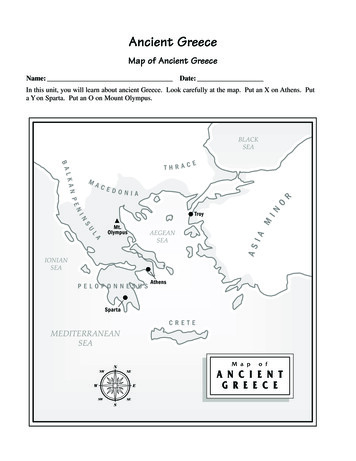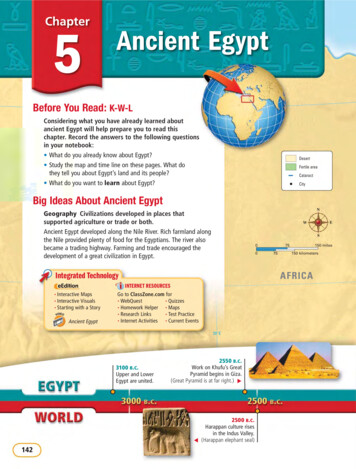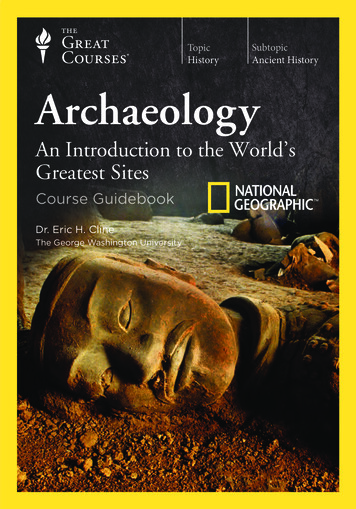
Transcription
Ancient GreeceMap of Ancient GreeceName:Date:In this unit, you will learn about ancient Greece. Look carefully at the map. Put an X on Athens. Puta Y on Sparta. Put an O on Mount Olympus.
Ancient GreeceVocabulary1. Alexander the Great—ancient Macedonian who conquered most of theknown world around 334 B.C.2. Archimedes—ancient Greek inventor and mathematician who inventedArchimedes’ Screw3. aristocrats—wealthy property owners in ancient Greece4. Aristotle—ancient Greek philosopher; teacher of Alexander the Great5. Athens—ancient Greek city-state6. city-state—an ancient Greek region that has its own government andcitizenry7. Delian League—ancient Athens and her allies8. Euclid—ancient Greek mathematician who developed a branch ofgeometry9. freeman—male citizen of ancient Athens10. fresco—a type of painting in which a picture is painted onto a plaster wall11. helots—ancient Spartan slaves12. Hellenistic Age—ancient Greek civilization that emerged under the ruleof Alexander the Great13. Hippocrates—ancient Greek doctor who believed that disease had naturalcauses that could be studied14. immortal—to live forever15. Minoan civilization—early Greek civilization located on the island ofCrete (2500 B.C.)16. Mount Olympus—mountain on which the ancient Greeks believed thegods and goddesses lived17. Mycenae—early Greek civilization located in Peloponnesus (2000 B.C.)18. oligarchy—type of government where only a few people rule the many19. Peloponnesus League—ancient Sparta and her allies
Ancient GreeceVocabulary (cont.)20. Peloponnesian War—ancient conflict between Athens and Sparta (431 B.C.)21. polytheism—belief in more than one god22. Plato—ancient Greek philosopher; student of Socrates23. Pythagoras—ancient Greek mathematician24. Socrates—ancient Greek philosopher who developed the Socratic method25. Sparta—ancient Greek city-state26. thetes—ancient Athenian craftsman or laborer27. Thucydides—ancient general and historian who fought in and wroteabout the Peloponnesian War28. Trojan War—legendary battle between the ancient Greeks and the peopleof Troy in the 12th or 13th century B.C.
Early Greek CivilizationsBrief #1FocusThe physicalgeography ofancient Greeceplayed a big role inhow it developed.The physical geography of any place is an important key inunderstanding how and why its civilization developed the way it did.Ancient Greek civilization is a good example of this idea.Ancient Greece was located along the coasts of three large bodies ofwater: the Aegean Sea, the Mediterranean Sea, and the Ionian Sea.Because of this, the ancient Greeks were excellent sailors andtraders.The interior of Greece ismade up of a lot ofmountains. In ancienttimes, this kept populationsof people isolated from oneanother. This isolation helped communities developindependently from one another. These areas had their owngovernments and their own ideas about how things should bedone. Eventually, these independent communities would growinto Greek city-states. A city-state was a region in ancientGreece with its own government and citizenry. Athens,Sparta, and Thebes were important ancient Greek city-states.Vocabulary1. city-state2. Minoan civilization3. fresco4. MycenaeCrete and MycenaeAncient Greece consisted of many islands located out in the Mediterranean Sea. One ofthese islands was called Crete. In about 2500 B.C., the Minoan civilization existed there.The civilization gets its name from King Minos.The Minoans were great traders. They were also skilled potters and painted beautifulfrescoes on the walls of their palaces. A fresco is a painting on a plaster wall.In about 2000 B.C., the Minoan civilization began todecline. No one is really sure why this happened.Scholars do know, however, that some Minoansmigrated to and settled on the mainland of Greece.After a time, these settlements grew into powerfulcity-states.One of these Greek city-states was called Mycenae.It was located in an area on the Greek mainlandcalled the Peloponnesus. The Mycenae people werewarriors, and they built a city which was fortified byhuge stone walls. The huge stone lions that guard theentrance to the Mycenae citadel (a kind of palace)still stand to this very day.Fast FactThe palace of King Minoshad 1500 rooms!
Athens and SpartaBrief #2FocusAthens and Spartabecame two of themost powerful Greekcity-states.Although Athens and Sparta were both a part of what isconsidered to be Ancient Greece, they were two independent citystates. These two city-states had different cultures and politicalsystems, but they did speak the same language.Politics in Ancient AthensThe political system in Athens in 500 B.C. was ademocracy. Ancient Athens had elected officials and anassembly.To be part of the Athenian Assembly, you simply had to bea citizen of Athens. Of course, the ancient Athenians didkeep slaves. Slaves were not allowed to take part inpolitics. In addition to the assembly, there was also acouncil of five hundred members. The job of the councilwas to execute the decisions made by the Assembly.The ancient Athenians believed that it was every citizen’s duty to participate in politics.Citizens had to serve on juries and be informed and able to discuss the issues that wereimportant to their city.Life in Ancient AthensLike most civilizations, Athenian society had astructure. Freemen were the male citizens ofAthens. Among the freemen there were aristocrats.Aristocrats were wealthy men who ownedproperty. Aristocrats could also be military men.Farmers made up the middle ranks. At the bottomwere the thetes. The thetes were craftsmen andmen who did manual stocratsthetesoligarchyIn ancient Athenian society, boys, especially if theycame from the aristocracy, were well educated. Theystudied math, music, reading, and writing. Older boys could go to a kind of college wherethey continued their studies in philosophy and ethics. All male citizens were required totrain in the military for two years.Life was different for girls in ancient Athens. They were not educated, even if they did comefrom wealthy families. Women were considered to be the property of their husbands.Athenian girls learned domestic duties like spinning and weaving.
Athens and SpartaBrief #2 (cont.)Vocabulary (cont.)7.8.9.10.1 1.12.oligarchyhelotsDelian LeaguePeloponnesus LeaguePeloponnesian WarThucydidesThe Military in Ancient SpartaThe government of Ancient Sparta was a kind ofcombination of an oligarchy and a democracy. Anoligarchy is a government that is led by a few people.(Ancient Sparta did have some elected officials.)In ancient Sparta, the military was the most important thingin their politics and society. When boys turned seven yearsold, they were taken from their parents and sent away tolearn how to be soldiers. They were treated badly andgiven very few clothes and little food. They were expectedto steal what they needed in order to survive. This is howthe Spartans taught survival skills. As a result, the Spartanarmy was the strongest and most feared military in theregion.Life in Ancient SpartaPhysical strength was highly prized in ancient Spartansociety, for both men and women. Everyone wasexpected to exercise and be physically fit. TheSpartans frowned upon luxuries and comfort. Beingtough and self-reliant was important.Unlike in ancient Athens, Spartan women wereeducated. They learned how to read and write. Theytook part in athletics. They were also allowed to ownproperty. The Spartans believed that all of thesethings would help Spartan women have healthy babies.Fast FactSpartan infants would beput to death if they weresick or weak.Spartans usually married at about the age of twenty.But even after marriage, Spartan men lived most of their lives in military camps away fromtheir wives.Most city-states in ancient Greece had slaves, but the slave population in ancient Sparta wasenormous. The Spartan slaves were called helots. They were treated very badly — beaten,humiliated, and often murdered. Because the helot population was so huge, theyoutnumbered the Spartans. So the Spartans had a hard time keeping them under control.There were often slave rebellions, which challenged Spartan authority.
Athens and SpartaBrief #2 (cont.)The Peloponnesian WarThe Greek city-states of Athens and Sparta both had power and influence in the region. Theyeach also had alliances with various city-states. Athens formed the Delian League. TheDelian League was a group of many Greek city-states, including Thessaly and Thrace.The Delian League was originally formed to fight the Persian Army when they invadedAthens in 490 B.C.Sparta had allies in the region, too. The Greek city-states who allied with Sparta werecalled the Peloponnesus League. They included Corinth and Macedonia.War broke out between Athens and Sparta and their rivals in 431 B.C. This twenty-sevenyear conflict between Athens and Sparta is known as the Peloponnesian War.
Athens and SpartaBrief #2 (cont.)The Peloponnesian War (cont.)The Peloponnesian War consumed the entire region. Sometimes Athens would seem to bewinning, and at other times Sparta would be victorious. Athens had a strong navy, and therewere many battles at sea fought during this conflict. But Sparta had a powerful land army.The army attacked villages and towns, and destroyed farms.The constant fighting weakened both sides in the conflict, but it was Athens that surrenderedin 404 B.C. Although Sparta was the victor, the war had taken its toll on them, too. Theywere never again the superpower they once were.ThucydidesThucydides was a general in the Athenian army. He fought during the PeloponnesianWar. After the war, he wrote a detailed history of it called History of the Peloponnesian War.It is a collection of eight books. In his books, Thucydides strove to be impartial and fair inhis telling of the events, even though he was an Athenian general. It was really the first timea balanced approached to the telling of history had been attempted. For this reason he isconsidered to be the father of modern history.
Greek MythologyBrief #3FocusAncient Greekmyths and legendsare still populartoday.The ancient Greeks were polytheistic. Polytheism means that youworship more than one god. The ancient Greeks had many, manygods. They believed that their gods were immortal. If something isimmortal, that means that it can live forever. The ancient Greeksalso believed that their gods lived on Mount Olympus. MountOlympus is a real place located in northern Greece.Ancient Greek myths, like most myths, were stories that people toldthat helped to explain some of the mysteries of life and the naturalworld. Greek myths explain how life began, how the seasons came tobe, and what happens to people after death.Major Greek Gods Zeus is the king of the gods. He rules thethunder, rain, and lightning, amongother things. Hera is the wife and sister of Zeus. She hasa jealous streak and can be quite vengeful. Poseidon is the god of the seas and thebrother of Zeus. He lives at the bottom ofthe ocean and rules the waves.Vocabulary1. Polytheism2. immortal3. Mount Olympus4. Trojan War Demeter is the goddess of agriculture. Athena is the goddess of wisdom. She is the daughter of Zeus. Athens is named forthis goddess. Hestia is the goddess of the home. Aphrodite is the goddess of beauty and love. She was born from the foam of the sea. Apollo is the god of light and truth. He is also young and handsome. Ares is the god of war. He is the son of Hera. Artemis is the goddess of the hunters and animals. She is the twin sister of Apollo. Hephaestus is the god of fire and volcanoes. He was born deformed. He is also askilled blacksmith. Hermes is the messenger of the gods. He also watches over travelers and shepherds.He likes to play practical jokes.
Greek MythologyBrief #3 (cont.)Heroes and LegendsGreek Mythology is full of stories about the lives of heroes and legendary events and people.One of these events is the Trojan War. The Trojan War is a legendary war that wasfought between the ancient Greeks and the people of Troy in the 12th or 13th centuryB.C. According to Greek legend, the gods took sides in the conflict and helped mortals onboth sides. The most famous books about the Trojan War are epic poems written by Homerin about the 8th or 9th century B.C. These books are called the Iliad and the Odyssey. The Trojan HorseOne of the most well-known episodes of theTrojan War concerns something called theFast FactTrojan Horse. According to the legend, theGreeks were trying to find a way to get inside ofThe Olympics began as athe walled city of Troy. They built a huge horseway for ancient Greeks tomade of wood. The inside of the horse washollowed out. Greek soldiers hid inside of thehonor their gods.horse. Other Greek soldiers sailed away onships. When the Trojans saw the Greeks vesselsleaving, they thought that they were out ofharm’s way. They didn’t know that there wereother Greek soldiers hiding within the horse.The Trojans brought the horse into the city ofTroy. Once inside, the Greek soldiers sprang from the horse and attacked the city. PersephonePersephone is the daughter of Demeter, the goddess of the harvest. One day, whilePersephone played outdoors in the sunshine, she was kidnapped by Hades, the god ofthe underworld in the land of the dead. Hades took Persephone to his undergroundworld because he wanted Persephone to be his wife. Persephone grew sadder andsadder every day that Hades kept her in the underworld. She refused to eat or drinkanything.The whole time that Persephone was in the underworld, her mother had no idea whereshe was. She frantically looked for her everywhere, but couldn’t find her. Finally,Demeter asked her brother Zeus for some help. Zeus knew that Persephone was withHades and ordered him to return her to the land of the living. Hades refused. Finally,Hades agreed to return Persephone only if she had not eaten or drunk anything fromthe underworld. Although Persephone didn’t eat much, she did have six pomegranateseeds.An agreement was made that because Persephone had eaten six pomegranate seeds thatshe would spend six months out of the year with him and six months out of the yearwith her mother. For the six months that Persephone spends with Demeter the cropsgrow in warm sunshine. But when Persephone has to go back to the underworld,Demeter grows sad, and her sadness brings winter and the death of the crops.
The Legacy of Ancient GreeceBrief #4FocusAncient Greece isthe birthplace ofwestern civilization.Ancient Greece is considered the birthplace of western civilization.This is because the ancient Greeks made so many majorcontributions to arts, science, politics, and philosophy. What wouldlater become known as the Renaissance had its origins in ancientGreece.MathematicsThe ancient Greeks made important discoveries anddeveloped many mathematical theories that are still usedtoday. One of these ancient Greek mathematicians wascalled Pythagoras. He was the first person to describe theearth as being spherical. He also developed theoriesregarding the connection between math and music. Thestudents of Pythagoras went on to develop the PythagoreanTheorem used with right triangles.Euclid was another influential ancient Greekmathematician. In fact, it is Euclid who is creditedwith discovering a field of mathematics that wasunknown at the time—that of plane geometry. It isover two thousand years since Euclid lived, yetstudents today still learn geometry using the axiomshe discovered.Archimedes was a famous ancient Greek inventorand mathematician. Like Euclid and Pythagoras, hedeveloped many different mathematical theories thatare still in use today. He also invented a device thatis still used for raising water from a lower level to ahigher level. This invention is called nder the GreatHellenistic AgeHippocratesPhilosophyAnother area in which the ancient Greeks excelled and made enormous contributions to isthe field of philosophy. Philosophy is the branch of learning and inquiry that seeks todiscover the answers to difficult questions about truth and knowledge.One of the most important ancient Greek philosophers was called Socrates. Socratessaid the unexamined life is not worth living. He meant that all people should seekknowledge and awareness, and the truth about how the world works. Socrates was aninfluential teacher. He developed a method of teaching by asking students questions untilthey reached a final conclusion. This is called the Socratic Method. The Socratic Method isbased upon using reason to discover the truth.
The Legacy of Ancient GreeceBrief #4 (cont.)Philosophy (cont.)One of Socrates’ students named Plato was also a very influential ancient Greekphilosopher. Like Socrates, he believed in rational thought and reason. He believed that ifpeople lived by reason, then there would be no problems in the world.Aristotle is the third of whom scholars call the big three of ancient Greek philosophy.Aristotle was a student of Plato’s. He wrote many books on topics like politics, poetry,music, and biology. He is also known to be the teacher of Alexander the Great.Alexander the GreatAlexander the Great was the King of Macedonia, a Greek city-state in 334 B.C. He wasalso a brilliant military commander. Alexander conquered Persia, Syria, Phoenicia, andEgypt all before the age of thirty-three. Alexander the Great is considered to be one of thebest military commanders of all time.Alexander’s rule lasted for thirteen years. The civilization that emerged from his militaryconquests was a blend of Greek and Asian cultures. It is called the Hellenistic Age.During this period in ancient history, the influence of Greek culture could be felt all overmost of the known world. Alexander founded the ancient city of Alexandra in Egypt. It ishere, in this port city, where the Lighthouse of Alexandria was built. This was a huge andimpressive structure. Archeologists have found some of the remains of this ancientlighthouse on the floor of the surrounding harbor.HippocratesThe ancient Greek doctor Hippocrates is considered to be the father of modern medicine. Hetook a more scientific approached to help the sick. In his time, many people thought diseasecould be caused or cured by supernatural forces, like the gods. But Hippocrates believed thatillness had natural causes and therefore natural cures. He also wrote the Hippocratic Oath,which contains advice that doctors have been heeding for thousands of years. One of themost famous parts of the Oath reads:I will use dietary regiments which will benefit my patients according to mygreatest ability and judgment, and I will do no harm or injustice to them.
Ancient Greece Vocabulary 1. Alexander the Great—ancient Macedonian who conquered most of the known world around 334 B.C. 2. Archimedes—ancient Greek inventor and mathematician who invented Archimedes’ Screw 3. aristocrats—wealthy property owners in ancient Greece 4. Aristotle—ancient Greek philos










